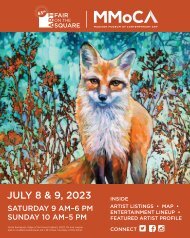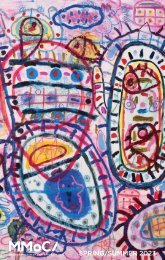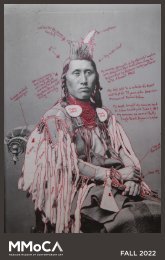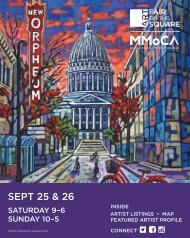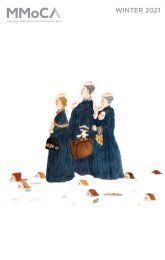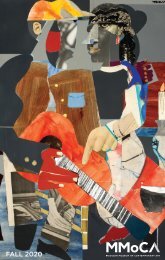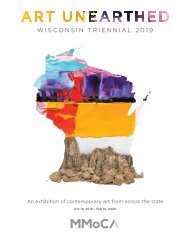Sebura&Gartelmann: Bonded exhibition catalog
Exhibition essay, images, and an interview with the artists. This catalog accompanies the exhibition in the Imprint Gallery.
Exhibition essay, images, and an interview with the artists. This catalog accompanies the exhibition in the Imprint Gallery.
You also want an ePaper? Increase the reach of your titles
YUMPU automatically turns print PDFs into web optimized ePapers that Google loves.
Q. I’m from a hockey area, that<br />
makes complete sense in terms of<br />
being cost prohibitive. Do you think<br />
that parallel experience is what<br />
drew you together and has helped<br />
fuel your collaboration?<br />
JS: Oh, yeah. 100%. Yeah, like I said,<br />
the supportive nature of what the<br />
skateboarding community is like.<br />
And Alex and I have talked about this<br />
before, the idea that if it wasn’t for<br />
skateboarding I wouldn’t have been<br />
interested in art, nor music and punk<br />
rock and so when Alex and I met we<br />
had that similar parallel, right? That<br />
those things were kind of a part of<br />
that, at least in our areas, but we<br />
were a part of that specific culture.<br />
We had common ground and so that<br />
was kind of our first towing of, “Oh,<br />
I know you like. We could be friends.<br />
Definitely.” And then it just built from<br />
there, right? It was, “Oh, you had this<br />
experience. I had a similar experience,”<br />
and kind of built on it from there and<br />
kind of back and forth, back and<br />
forth.<br />
AG: And I also think that in a more<br />
foundational underpinning of our<br />
practice, that space of adolescence was<br />
one that was incredibly permissive. You<br />
know, as opposed to being in these<br />
other realms that are prescriptive<br />
around adults basically dictating how<br />
you should function, what you should<br />
be doing, how you should be spending<br />
your time, how you should think about<br />
the world, how you should think<br />
about your future. And so one of the<br />
big differences between our personal<br />
practices and our collaborative<br />
practice is that it’s all about permission.<br />
There’s very few, if any, hang-ups on<br />
just trying stuff out. If somebody has<br />
an idea, where in our own practices, we<br />
will both talk ourselves out of doing<br />
anything for any reason. It’s so much<br />
harder to make work. And so I think<br />
that because there’s this kind of shared<br />
ideological foundation about how<br />
to operate in the world, through this<br />
lens of permission giving, that that<br />
kind of space of growing up that’s<br />
fundamental to identity shaping has<br />
played a really big part in how we<br />
work together.<br />
32








